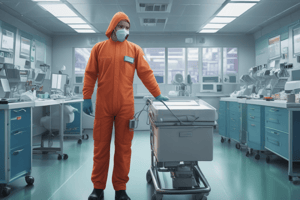Podcast
Questions and Answers
What is the primary reason why employers in the EMS field cannot guarantee a 100% risk-free environment?
What is the primary reason why employers in the EMS field cannot guarantee a 100% risk-free environment?
- Inadequate supply of personal protective equipment (PPE)
- The inherent nature of the job involving exposure to risks (correct)
- Failure to comply with OSHA, CDC, and NFPA regulations
- Lack of proper training and education
Which of the following is NOT a component of an effective infection control plan for EMS workers?
Which of the following is NOT a component of an effective infection control plan for EMS workers?
- Implementing strict quarantine measures for all patients (correct)
- Providing education and training
- Defining exposure risks
- Offering hepatitis B vaccinations
What is the primary way for EMS workers to gain immunity against infectious diseases?
What is the primary way for EMS workers to gain immunity against infectious diseases?
- Through regular sanitization and disinfection practices
- By strictly adhering to personal protective equipment (PPE) guidelines
- Through immunization, vaccination, or previous infection (correct)
- By maintaining a healthy lifestyle and regular exercise
Which of the following vaccinations is NOT mentioned as recommended for EMS workers?
Which of the following vaccinations is NOT mentioned as recommended for EMS workers?
What is the primary role of EMS workers in illness and injury prevention within their communities?
What is the primary role of EMS workers in illness and injury prevention within their communities?
What is the purpose of post-exposure management protocols for EMS workers?
What is the purpose of post-exposure management protocols for EMS workers?
Study Notes
- Employers in the EMS field cannot guarantee a 100% risk-free environment due to the nature of the job, but they must follow OSHA, CDC, and NFPA regulations to minimize exposure risks.
- Infection control plans should be easily accessible to EMS workers to establish routines that include procedures to reduce infections in patients and healthcare personnel.
- Components of an infection control plan involve defining exposure, providing education and training, offering hepatitis B vaccinations, supplying appropriate PPE, educating on cleaning practices, conducting testing for diseases like tuberculosis, and having a post-exposure management plan.
- Immunity is crucial in preventing infections, which can be gained through immunization, vaccination, or previous infection, but it may only offer partial protection in some cases.
- EMS workers should maintain personal health through annual exams, recommended immunizations, and consider vaccinations for diseases like hepatitis B, tetanus, measles, mumps, rubella, and flu.
- In the event of exposure to infectious diseases, EMS workers must follow post-exposure management protocols, which may include reporting, screening, and potentially receiving prophylaxis depending on the situation.
- EMS workers play a role in illness and injury prevention within their communities and are often seen as high-profile role models for early intervention and education.
- Unintentional injuries are a significant cause of death across all age groups, highlighting the importance of scene safety and personal protection for EMS providers.
- EMS providers need to be cautious of various hazards on scenes, such as vehicle stability in crashes, traffic hazards, electricity risks, and potential for mass violence incidents.
- Proper protective clothing and gear are essential for personal safety, including eye protection, ear protection in loud environments, skin protection from sun exposure, and potentially body armor for added safety.
Studying That Suits You
Use AI to generate personalized quizzes and flashcards to suit your learning preferences.
Description
Test your knowledge on infection control practices and personal safety measures for EMS workers. Learn about regulations, components of infection control plans, immunity, vaccinations, exposure management, and scene safety tips.



